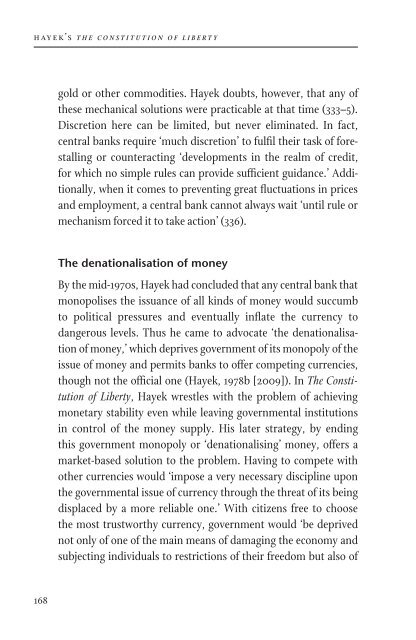Hayek's The Constitution of Liberty - Institute of Economic Affairs
Hayek's The Constitution of Liberty - Institute of Economic Affairs
Hayek's The Constitution of Liberty - Institute of Economic Affairs
You also want an ePaper? Increase the reach of your titles
YUMPU automatically turns print PDFs into web optimized ePapers that Google loves.
h ay e k ’ s t h e c o n s t i t u t i o n o f l i b e r t y<br />
p r e v e n t i n g i n f l a t i o n<br />
gold or other commodities. Hayek doubts, however, that any <strong>of</strong><br />
these mechanical solutions were practicable at that time (333–5).<br />
Discretion here can be limited, but never eliminated. In fact,<br />
central banks require ‘much discretion’ to fulfil their task <strong>of</strong> forestalling<br />
or counteracting ‘developments in the realm <strong>of</strong> credit,<br />
for which no simple rules can provide sufficient guidance.’ Additionally,<br />
when it comes to preventing great fluctuations in prices<br />
and employment, a central bank cannot always wait ‘until rule or<br />
mechanism forced it to take action’ (336).<br />
<strong>The</strong> denationalisation <strong>of</strong> money<br />
By the mid-1970s, Hayek had concluded that any central bank that<br />
monopolises the issuance <strong>of</strong> all kinds <strong>of</strong> money would succumb<br />
to political pressures and eventually inflate the currency to<br />
dangerous levels. Thus he came to advocate ‘the denationalisation<br />
<strong>of</strong> money,’ which deprives government <strong>of</strong> its monopoly <strong>of</strong> the<br />
issue <strong>of</strong> money and permits banks to <strong>of</strong>fer competing currencies,<br />
though not the <strong>of</strong>ficial one (Hayek, 1978b [2009]). In <strong>The</strong> <strong>Constitution</strong><br />
<strong>of</strong> <strong>Liberty</strong>, Hayek wrestles with the problem <strong>of</strong> achieving<br />
monetary stability even while leaving governmental institutions<br />
in control <strong>of</strong> the money supply. His later strategy, by ending<br />
this government monopoly or ‘denationalising’ money, <strong>of</strong>fers a<br />
market-based solution to the problem. Having to compete with<br />
other currencies would ‘impose a very necessary discipline upon<br />
the governmental issue <strong>of</strong> currency through the threat <strong>of</strong> its being<br />
displaced by a more reliable one.’ With citizens free to choose<br />
the most trustworthy currency, government would ‘be deprived<br />
not only <strong>of</strong> one <strong>of</strong> the main means <strong>of</strong> damaging the economy and<br />
subjecting individuals to restrictions <strong>of</strong> their freedom but also <strong>of</strong><br />
one <strong>of</strong> the chief causes <strong>of</strong> its constant expansion.’ While severely<br />
limiting government’s discretion in matters <strong>of</strong> monetary policy,<br />
Hayek does see a need for considerable discretion in its management<br />
<strong>of</strong> financial policy. As ‘the biggest spender and investor,’<br />
government should, ins<strong>of</strong>ar as practicable, ‘distribute its expenditure<br />
over time in such a manner that it will step in when private<br />
investment flags, and thereby employ resources for public investment<br />
at the least cost and with the greatest benefit to society’<br />
(1979: 59; cf. 57–8).<br />
In view <strong>of</strong> Hayek’s later position, it should be mentioned<br />
that in <strong>The</strong> <strong>Constitution</strong> <strong>of</strong> <strong>Liberty</strong> he does question, in a lengthy<br />
footnote, whether central banks should monopolise the issue <strong>of</strong><br />
all kinds <strong>of</strong> money: ‘there seems to be no reason whatever why<br />
the state should ever prohibit the use <strong>of</strong> other kinds <strong>of</strong> media <strong>of</strong><br />
exchange, be it some commodity or money issued by another<br />
agency, domestic or foreign’ (520–21). <strong>The</strong> footnote does not<br />
consider whether competition from private banks might be sufficient<br />
to restrain government’s monetary institutions.<br />
168<br />
169












